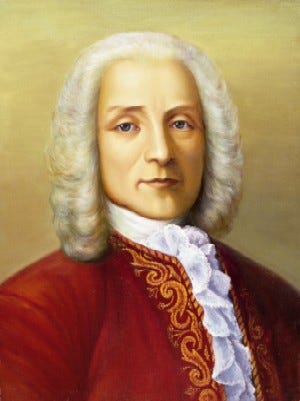I must declare here at the outset, while the last article was very singular and strictly to the point, this one will be discussing a more abstract beauty that one finds in American culture. Keeping with the last article, we will begin in the Baroque Era.
This time, we get to uncover a forgotten jewel in American history: Charles Theodore Pachelbel. The name “Pachelbel” may already be familiar to those in the audience due to Johann Pachelbel’s Canon in D, often heard at weddings (much to the dismay of any cellist). Charles Theodore was the son of the more popular Johann, but this is not to say that Charles Theodore is unimportant!
Charles Theodore Pachelbel would find his way to the American colonies at least by AD 1733. What little record we have of his life shows that he was taking part in the installation the organ at Trinity Church in Newport, Rhode Island (the organ is still there to this day, and such rich history is fitting for what would become one of the most important Anglican parishes in the Unites States). After spending a couple years as Trinity Church’s organist, Charles Theodore would move to the South, Charleston in particular, becoming the organist of St. Phillip’s Church. Before dying in 1750, Charles Theodore mentored Peter Pelham, another important but overlooked figure in American musical history, and established one of the first dedicated schools for vocalists.
It may be tempting to compare Pachelbel’s seemingly minor work to the very influential Psalm chanting that I discussed in the last article, but this is viewing 1730s music through a very modern lens. Take a moment to consider the state of music at the time. One had to be near the instruments in order to listen, entirely unlike today’s world of ubiquitous digital music. More formal instruments, like harpsichords and violins, were comparatively much more expensive in the past as well, having to be handcrafted by a select few European families and carefully transported to their destination by cart or sail. This fact alone made music a luxury, but there is yet another factor to consider. People only care to listen to good music, meaning that live performances required good musicians, which was again a scarce resource only coming from Europe at this time. Put all this together, and a simple concert in the Americas required talented, rich Europeans who cared enough to relocate halfway across the world, trusting in God for safe passage across the ocean of their persons and extremely expensive instruments, to entertain what appeared to be upstart merchants and frontiersmen that looked closer to land-owning peasants.
The fact that America received a Pachelbel is nothing short of miraculous. Even more miraculous is the fact that this very prestigious man saw fit to carry on the dying fashion of Baroque music, mentoring very talented Americans in voice and organ. Because of Pachelbel, America would not only experience the height of the Baroque Era, including the splendor of its church organ repertoire, but it would be America that would carry on the Baroque tradition and its influences far beyond the ever-changing fashions of Europe, whose “Enlightened” kings were already beginning to denigrate such musical giants as J.S. Bach.
And it is this reason that brought me to write. Time and time again, America finds itself carefully preserving the greatness of European culture while the Old World tears itself apart. Political decentralization, a wonderful invention that could only come from Europe, is only meaningfully left alive today in the States. The great churches of the Reformation, like the Old Lutherans and the Church of Scotland, is today found with the Lutherans and Presbyterians in America rather than the cultural and theological liberals in Europe. The pattern is found in every sphere of American life, but in music, what is quickly disregarded in Europe, whether it is Pachelbel’s divine Baroque music or von Karajan’s “fascistic” orchestra, is kept going far beyond the fickle whims of Europe.
And this is what is so beautiful about America’s culture. What the Europeans rashly discard and suppress as unfashionable and dated, we let thrive, displaying for us and the rest of the world the beauty of a European culture which has been given the liberty to develop far beyond what the Old World imagined possible.






Great read. There are a great variety of topics that need rediscovering for American culture. A great many things memory holed, forgotten, thrown aside, and most of all intentionally smothered.